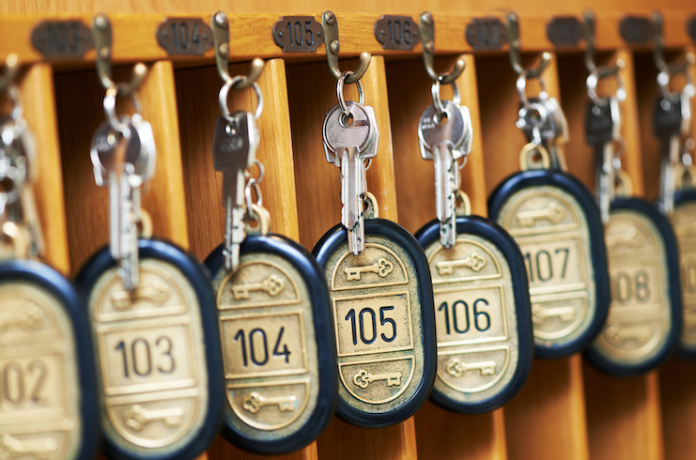
While today’s hotel guests largely use electronic access cards to enter assigned guestrooms, hundreds to thousands of mechanical keys are essentially used daily on hotel properties. Housekeeping staff use keys for access to guestrooms to perform job duties. Hotel security, maintenance staff, and hired contractors also use keys for access to equipment, maintenance, supply rooms, fleet vehicles, and guestroom emergencies.
So, how does a hotel property manage all those keys? Key control policies and procedures are an integral component of a master security plan for hospitality properties, yet key control is often overlooked or vaguely defined to cover all those important key control elements for hospitality properties. Let’s examine ten tips for creating a comprehensive hospitality key control policy.
1Include a Key Control Policy in the Master Security Plan
Define the purpose and objectives, which are mainly to prevent the misuse of keys that leads to security breaches that affect the safety of the hospitality property and its population. Next, define the rules related to key control about proper usage, including not loaning or duplicating them, letting anyone borrow them, or taking them off the property for any reason.
2Implement a Key Control System
Consider an electronic key control system to manage keys if keys are currently residing on a manual pegboard or in a key box with a sign-out log where anyone can potentially gain access to them for nefarious reasons. An electronic key control system tracks and accounts for all keys and identifies who is using them and provides an audit trail.
3Appoint a Key Control Administrator
The appointed key control administrator manages the hotel’s key control system and enforces its related policies. Select someone who is readily available throughout the day, such as a security or maintenance manager.
4Define Who Needs Access to Keys and When and Why
It is recommended that grandmaster and master keys should only be handled by the key control administrator. First, arrange sub-master keys by department. Next, arrange them by staff members who need them. Then, arrange them by shift or schedule. These guidelines keep keys in the hands of staff members only when they need them. An electronic key control system automatically controls the keys and access, releasing them to authorized individuals only at designated times according to what has been programmed into the system.
5Choose Easy-to-Access Locations for the Key Control System
Whether a hotel property has one or more key control cabinets, access to keys needs to be conveniently located for all staff members.
6Color Code Key Rings
Color coding key rings for different tasks helps to keep keys organized and identifiable. This saves time and streamlines processes.
7Train and Educate Hotel Staff
Train all hotel employees responsible for using the key control system. Remind them that all keys will remain on the premises and will be returned to the key control system at the end of their shifts for security and safety purposes. Provide training sessions for newly onboarded staff and be sure to remove permissions for anyone who is no longer employed at the hotel.
8Make Master Keys Available for Emergency Responders
A key control system provides a known location for master keys that first responders can access in case of an emergency at the hotel. Share the key control plan and the location of a special key ring for first responders so they can access any part of the hotel in the event of an emergency or disaster.
9Manage Those Important Assets
Key control cabinets can be configured to control access to important assets with locker modules as well as key modules. Locker modules secure data ports, laptops, mobile phones, handheld radios, panic button fobs, personal belongings, and more.
10Conduct Key Audits Regularly
Audit reports are available at any time with an electronic key control system because every key transaction is recorded by the system’s software. Review the key control plan annually and make amendments if needed. Account for any new keys and locks that need to be added into the system that were overlooked.
Key control policies and procedures that are complete and reviewed regularly ensure that hospitality properties are optimized for security so that keys do not become lost or missing or end up in the wrong hands. Integrate an electronic key control system with other security systems for more comprehensive data between the key control system, access control system, and video surveillance system for safer and more secure hospitality properties.
Sponsored by Morse Watchmans.











